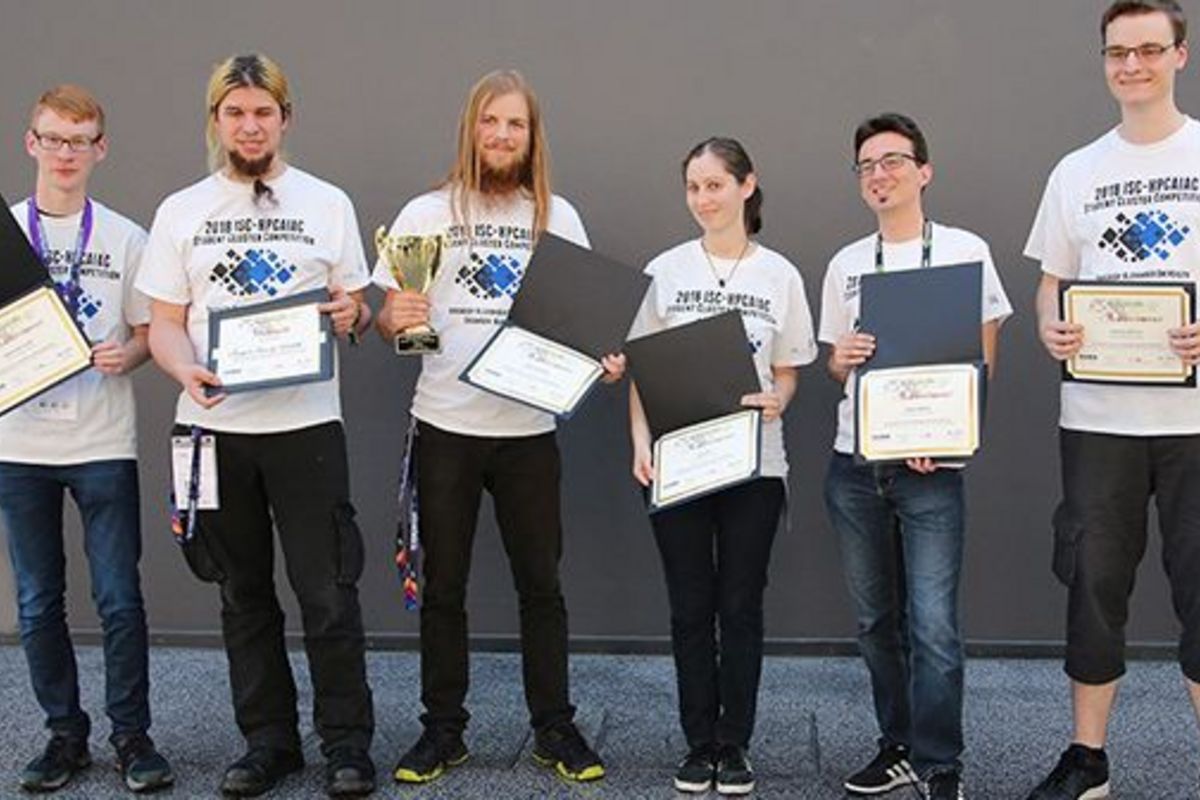For the fourth consecutive year, the Gauss Centre for Supercomputing (GCS) ensured that German university students would be represented in the Student Cluster Competition (SCC). This year, however, GCS increased the scope of its education outreach, resulting in another award and valuable high-performance computing (HPC) experience for undergraduates. The interest in HPC at German universities seems to be snowballing, and GCS wants to meet that enthusiasm with an equal amount of support.
GCS supported student teams from Universität Hamburg, Heidelberg University, and Friedrich-Alexander-Universität Erlangen-Nürnberg (FAU). For the second year in a row, a student team from FAU won the Linpack award during ISC18, the annual international supercomputing conference in Frankfurt, Germany. The team narrowly missed the world record—51.77 teraflops, set last year during the SC17 competition in Denver, Colorado, USA—with a Linpack performance of 51.56 teraflops.
“The SCC at ISC18 was a great opportunity for us to get insight into HPC and its industry, as well as to meet other students with similar interests from all over the globe,” said team member Christian Zöllner. “The location is perfect, as you can always take a stroll around the fair to see what the business side of things is about, when you need a breather from command lines and manuals. We spent the most time at our booth, though, tuning our system and optimizing our code. We are really happy that all this effort resulted in being crowned with the linpack award in the end. It was the first HPC competition for us students, and after this cool experience, we will definitely encourage others to join future teams."
Every year, FAU offers students from a variety of scientific and computer science disciplines the opportunity to take a course that, with the support of sponsors, culminates with the SCC, meaning that despite the turnover among the participants, the course is attractive to a variety of talented students and the university remains competitive with this infrastructure and an experienced group of mentors and coaches. FAU researcher Alexander Ditter has long worked with the FAU students participating in the SCC, and this year used his mentoring experiences as inspiration to help organize a “birds of a feather” (BoF) session about HPC training and education at ISC18.
“HPC is an area with many different aspects, ranging from the actual assembly of a cluster node over the composition of several nodes into a cluster to the operation and maintenance of the system and the actual application domains and codes to be executed on the supercomputer,” Ditter said. “In my experience, as is the case in many other fields, deeper knowledge and understanding of low-level and hardware details is crucial for any performance optimization on the software level. At this year’s ISC, I enjoyed the fact that besides mentoring the student team, we could also arrange a BoF session on the topic of HPC education and increasing skills through competitions such as the SCC. Meeting and exchanging experiences with respect to the education of next generation of HPC experts is one of the major goals of the SIGHPC education chapter of ACM that I’m actively involved in.”
As the nation’s leading HPC institution, GCS tries to not only deliver world-class HPC resources, but also ensure that Germany continues to develop talent to make the most of increasingly complex supercomputers. In addition to being a great networking opportunity for aspiring computer scientists, the SCC also offers students studying domain sciences the opportunity to see how supercomputing can be used to do impactful research in their areas of study.
“Nowadays, no scientific field can omit the potential of using high-performance computing, and chemistry is no exception,” said Tobias Müller, FAU team member and chemistry student. “I have the feeling that some people are needed to connect the domain science worlds with the world of HPC, and I am really glad I didn’t miss out on the opportunity to participate in the SCC. It was sometimes hard to fit the course in my curriculum, as it was a whole new world for me, but I ultimately met a lot of new and interesting people and too see the state-of-the-art in HPC.”
Bridging the knowledge gap between computer scientists and researchers using HPC resources will only get more essential as the HPC community moves toward the exascale computing—computers capable of at least one billion billion calculations per second. “We try and play a role in ensuring that students at German universities who have interest in HPC can get exposed to real-world scenarios as early as possible,” said GCS Managing Director Dr. Claus-Axel Müller. “Hopefully this achievement will inspire even more young and interested talent to pursue careers in the realm of HPC.”
-Eric Gedenk, e.gedenk@gauss-centre.eu
